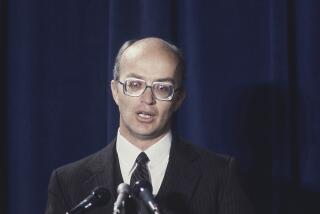POLITICS
- Share via
There are, no doubt, some Americans to whom Sen. Jesse Helms (R-N.C.) is a hero. But to others, he embodies much of what makes Washington so loathsome. A seasoned demagogue, a staunch bigot, a dinosaur, Helms is beloved by his Senate colleagues and courted by the administration, which he tyrannizes from the chair of the Senate Foreign Relations Committee. To watch Secretary of State Madeleine K. Albright pretend to like him is to be depressed by what politics requires of good people.
When Republican Gov. William F. Weld of Massachusetts attacked Helms for holding hostage his nomination as ambassador to Mexico, he broke the Washington rules. Instead of sucking up to the senator, he quit his job to fight him.
The act catapulted Weld into the nation’s imagination. In an instant, Weld acquired something rare in political life: authenticity. Here was a vessel for our Capraesque hopes. Here was someone who would risk everything for principle.
Weld’s rise is a measure of the public desperation to be rescued from the old order. It was this desperation that created Ross Perot in 1992, threw Democrats out of Congress in 1994, invented Colin L. Powell in 1996 and will surely be played to in the coming presidential cycle. The frustrated electorate keeps searching for ways to hit Washington over the head with a 2-by-4; this summer, Weld fits the bill nicely. He unites people against extremism, partisanship, ugliness. He makes cynical people risk having their hearts broken again.
What’s more, he’s a good story. There’s conflict. There’s a great bad guy. It satisfies the media’s appetite for melodrama. It’s the best thing you can say about news these days: It’s entertaining.
As quick as Weld’s rise, and as inevitable, is his trial-by-pundit, currently in progress. His motives are questioned. He didn’t really resign to take Helms on; he was just bored with being governor. He didn’t do it to become ambassador; he did it to enhance his presidential prospects in the year 2000. He did it to hold President Bill Clinton’s feet to the fire. He did it to exploit the turmoil among House Republicans. He’s a sanctimonious so-and-so who did it out of vanity, pride, a lust for air-time--anything but principle.
It is now next to impossible for Weld to make the case against Helms without Weld’s presidential aspirations becoming part of the story. Instead of Weld vs. Helms, the main event is really held to be Weld vs. Al Gore. Don’t be fooled by Weld’s authenticity: It’s a tactic. He’s just like the rest of them.
If something authentic really did occur in American politics, would we postmodern cynics have the wit to realize it?
To be sure, human actions have multiple causes; they are “overdetermined,” as psychiatrists say. But the problem with political analysis, as with psychoanalysis, is there is no end to it. All situations contain deeper motives. All interpretations are worth pursuing. Just as no shrink thinks a cigar is just a cigar, today only a naif would take Weld at face value. Whatever heroism a course may contain, there is always a way to contaminate it.
The trouble with cynicism is that experience warrants it. Perot turned out to be unstable. Speaker Newt Gingrich (R-Ga.) turned out to cop a plea. The young Turks of Congress are as uninterested in term limits and campaign-finance reform as the old guard. More often than not, when a politician rails against the Beltway, he’s doing it because his polls show it’s a hot button--not because he feels much antipathy toward the status quo. “No more business as usual!” is the rallying cry not only of the insurgents, but of the incumbents, too.
In such a world, Weld’s ambition disqualifies him as a worthy antagonist of Helms. The job of the media is to make sure that when David goes after Goliath, we understand that what David really wants is to be king.
Leaders don’t flourish in that kind of climate. Nor do followers; we’re too busy protecting ourselves against betrayal to become passionate about someone. Irony is less dangerous than enthusiasm. Authenticity is just an image, something that marketers confect: “It’s the real thing.” Not an ideal culture in which to conduct a democracy.
In trying to protect us against demagogues, the media may just be doing its job. Maybe Weld will turn out to be another Perot. But maybe what we’ve seen these past few days is a flash of the real thing. It would be fortunate if we could find out without destroying it.
More to Read
Get the L.A. Times Politics newsletter
Deeply reported insights into legislation, politics and policy from Sacramento, Washington and beyond. In your inbox twice per week.
You may occasionally receive promotional content from the Los Angeles Times.










